Hot Tub Electrician | Safe Hot Tub Electrical Installation
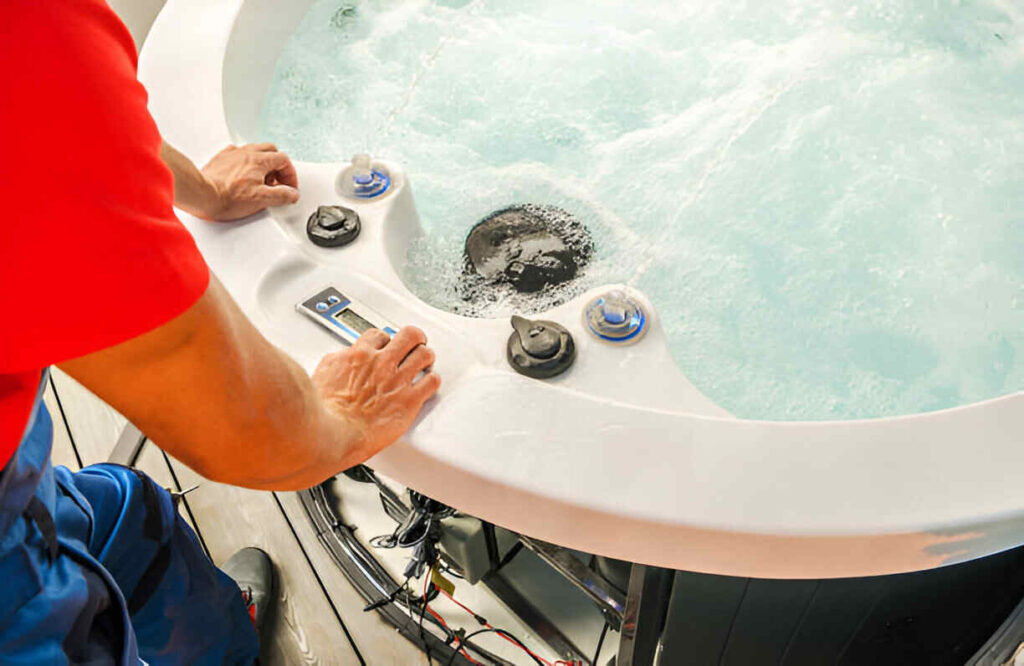
Hot Tub Electrician | Safe Hot Tub Electrical Installation Another great way to turn your backyard into a private getaway is to add a hot tub. It is essential to make sure that the wiring work on your hot tub was done correctly before you use it for a relaxing moment. It is necessary to hire a qualified hot tub electrician to make sure that your system works safely, quickly, and according to the rules. You can avoid making common mistakes when wiring a hot tub, and this guide will show you the essential steps you need to take. Professional planning can also save you time, money, and safety risks. Why Grounding the Cement Pad Is Essential Grounding the cement pad is one of the most frequently overlooked steps in hot tub electrical installation. Numerous contractors are either unaware or indifferent to the fact that this step is mandated by the 2023 National Electrical Code (NEC). A qualified hot tub electrician will consistently install a minimum of a #6 bare copper solid ground wire before the pouring of cement. This establishes a bonding system that mitigates the risks of electrical shock in areas with wet surfaces. It is possible to connect the grounding device to the rebar in your cement pad. If wire is used instead, it needs to be glued down properly, too. If you do this right before you pour the concrete, the job will be safer and cost less in the long run. Building a Career in Electrical Work If you’re curious about the technical aspects of hot tub wiring and electrical planning, starting an apprenticeship as an electrician could be an excellent option for you. Feel free to tackle household tasks, business projects, or even specialized ones like hot tubs and outdoor living spaces. It’s a gratifying job. Planning for Outdoor Features Alongside Your Hot Tub Numerous homeowners choose to add features beyond just a hot tub. You could add a fireplace, an outdoor stove, or landscape lighting to enhance your space. An experienced hot tub electrician will manage all these components to prevent expensive rework. For example: Fire pits generally require gas lines along with low-voltage electrical connections for ignition purposes. An outdoor kitchen counter, dry bar, or mini-fridge necessitates a dedicated 20-amp circuit. Transformers or outdoor lighting may be powered by a low-voltage conduit that is installed beneath the cement footing. Low-voltage conduit installed under the cement footing can power transformers or outdoor lights. Hot Tub Wiring and Safety Requirements Hot tubs require specific equipment and appropriate safety gear. Discover the essential insights that everyone should be aware of: A hot tub disconnect box must be positioned in a visible area and should not exceed a distance of 50 feet. Use the correct conduit: Schedule 80 PVC for underground applications, transitioning to Schedule 40 PVC above ground. When it comes to protecting outlets from the weather, bell boxes or GFCI outlets must be used. Gas regulators and electrical outlets should not interfere with each other. An experienced hot tub electrician will adhere to these steps to guarantee a safe and compliant installation. Why You Shouldn’t DIY Hot Tub Electrical Installation Setting up a hot tub is not a simple, one-day endeavor. Generally, a majority of projects require five to six visits to oversee groundwork, electrical wiring, inspections, and final connections. A DIY hot tub wiring job may result in: Breaking the law Risks of electrical shock Warranty on hot tubs void Afterwards, expensive fixes So, it is best to work with a licensed hot tub electrician who knows the safety rules and code requirements in your area. Final Thoughts It’s essential to install a hot tub safely, but the pool will look great in any outdoor area. When installing electricity in a hot tub, you need to pay extra attention to planning, grounding, and the correct wires. Hot tub engineers can help you protect your investment, make your house safer for your family, and maximize the use of your spa. FAQs About Hot Tub Electrical Installation Should I hire a skilled plumber to put in my hot tub? Absolutely! A friendly hot tub electrician will ensure that your installation is safe, up to code, and properly grounded to keep electrical dangers at bay. Can I hook up my hot tub to an extension cord? Not in the slightest. Hot tubs require a dedicated circuit and wiring. Using an extension cord poses risks, violates regulations, and may harm your spa. What kind of breaker does a hot tub need? Most hot tubs need a 50–60 amp GFCI breaker, but the exact size you need relies on the type and the manufacturer’s instructions. Why is it important to ground the cement pad? Grounding lowers the risk of getting an electric shock in wet places. The 2023 NEC says that a #6 copper ground wire or connected rebar/mesh must be used. External Link When mentioning National Electrical Code (NEC) → Link to: NFPA – National Electrical Code
Why You Need a Skilled Industrial Electrician for Your Facility
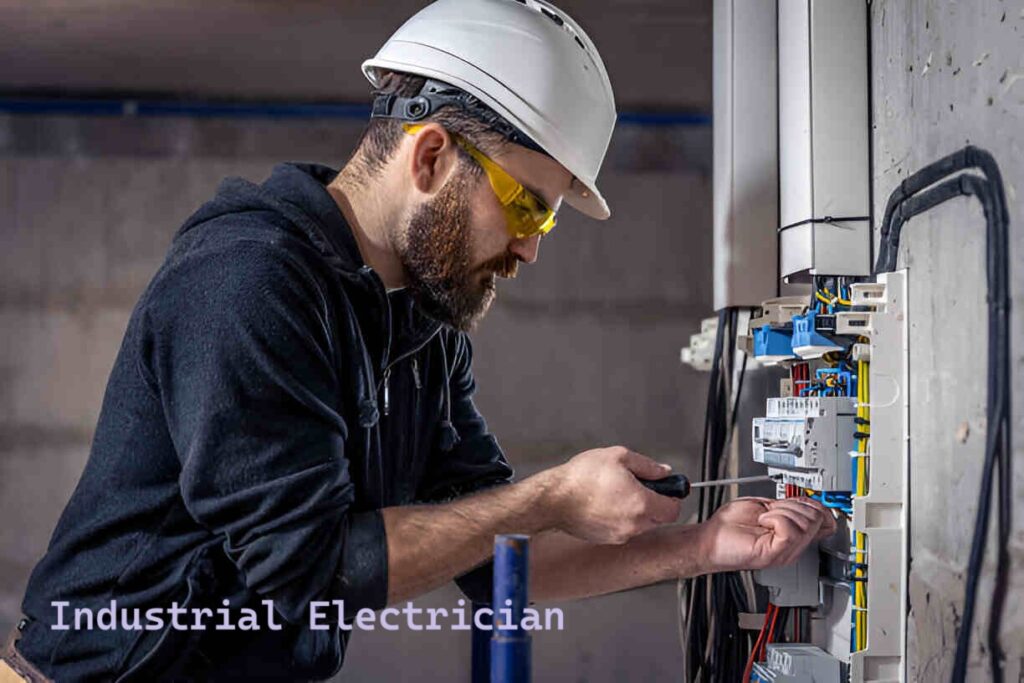
Why You Need a Skilled Industrial Electrician for Your Facility Electrical systems in a factory, warehouse, or other large industrial facility need to be efficient to ensure the building functions safely and efficiently. Your situation calls for the assistance of an experienced industrial electrician. On the other hand, industrial electricians receive training that prepares them to work with heavy machinery, high-voltage systems, and complex wire installations that ensure the smooth operation of manufacturing lines and factories. A lot of people who work in this field start out by doing an apprenticeship as an electrician. This gives them hands-on experience and safety training before they start working with complicated industrial systems. What is an Industrial Electrician? An electrician who works in industrial settings is a qualified expert in charge of installing, fixing, and maintaining the electrical systems in manufacturing facilities. The vast majority of the time, these locations have: Plants that make things Power plants Processing facilities for food Facilities devoted to automobiles Storage facilities and distribution hubs of tremendous size Additionally, they are responsible for working with wires, programmable logic controllers (PLCs), automated systems, and specialized equipment that are essential for the smooth operation of factories under the supervision of a Foreman Electrician. Why Your Facility Needs an Industrial Electrician 1. Safety and Compliance Heavy machinery and high-voltage devices are common in industrial settings. Electrical dangers, broken tools, and even accidents at work can happen when procedures are mishandled or not followed. An experienced industrial electrician will make sure that your building follows all local electrical codes and OSHA safety rules. 2. Reduced Downtime Every minute that a production line isn’t running, a company incurs significant financial losses. Preventive maintenance is something that industrial electricians do to find problems early and avoid costly breaks as much as possible. 3. Specialized Expertise Wiring that is difficult to understand, power systems that operate on three phases, and extensive maintenance skills are frequently required in industrial buildings. In comparison to electricians working in residential or Commercial Electrician settings, industrial electricians have a wide range of knowledge. 4. Energy Efficiency Industrial electricians help save money and the environment by replacing old systems, optimizing electricity distribution, and offering ways to use less energy. Key Responsibilities of an Industrial Electrician There is a wide range of tasks that an industrial engineer is responsible for. The following is a list of some of their responsibilities: Installation: installing new equipment connections, electrical systems, and control panels. Maintenance: As part of this, tools should be checked regularly, and the method should work well. Repairs: Getting rid of issues, fixing motors, and fixing control systems. Upgrades: Replacing old lines with new ones that use less energy and adding innovative technologies. Emergency Services: Helping quickly when problems arise out of the blue to keep downtime to a minimum. Skills Every Industrial Electrician Should Have For electricians to be successful in their work in a manufacturing environment, they require the following: Strong knowledge of safety rules and electricity codes Expertise in programmable logic controllers (PLCs) Being able to read and understand plans and expert drawings Hands-on experience with motors, transformers, and generators Problem-solving skills for diagnosing complex system issues Industrial Electrician vs. Commercial Electrician Many people get industrial electricians and business electricians mixed up. Both are about electricity circuits, but here are some of the main differences: Feature Industrial Electrician Commercial Electrician Work Environment Factories, plants, warehouses Offices, retail spaces, small businesses Voltage Levels High-voltage systems Medium-voltage systems Specialization Heavy machinery, PLCs, automation Lighting, wiring, office systems Complexity Advanced, highly technical Moderate Our team is an expert in Industrial Electrician services, but we also offer outstanding Domestic Electrician services for companies and homes. How to Choose the Right Industrial Electrician When hiring an electrician for your business, think about the following: Licensing and Certifications – Make sure they have the proper training to work with industrial systems. Experience – Find engineers who have a history of working in your field. Safety Record – A good safety record guarantees reliability. 24/7 Availability – Often, industrial sites need emergency services. References and Reviews – Read the case studies and comments. Benefits of Hiring a Professional Industrial Electrician Better safety in the workplace Less money spent on repairs Longer life for equipment Follow through with rules More production and efficiency Common Industrial Electrical Services Putting in and improving electrical systems Repairs and wires for the control panel Take care of motors and generators Setting up lighting for significant buildings Setting up and taking care of a backup generator Energy surveys and ways to make things more efficient Future of Industrial Electrical Services The industrial electrician’s job is changing because of Industry 4.0 and robotics. A lot of people work with Using innovative tools in factories Machines that are connected to the internet Green ways to get power Robotic tools with lots of tech It’s more important than ever to hire an electrician who is up-to-date and well-trained. Conclusion They are an integral part of the security, effectiveness, and efficiency of your facility, and you must take good care of them since they are more than just a service provider. When they have the right skills, industrial electricians are more than just service providers. Industrial electricians are extremely valuable to organizations because they ensure that they do not experience costly downtime, ensure that they adhere to the standards, and assist with current automation. Suppose you need expert Industrial Electrician services that are dependable, affordable, and tailored to the requirements of your facility. In that case, you should get in contact with Muhammad Technical Services as soon as possible. FAQs About Industrial Electricians Q1: One works in shops, while the other works in houses. What’s the difference? A factory with hard-to-understand, high-voltage equipment is where an industrial electrician works. Electricians who work in homes have a different job. Their job is to work on low-voltage electronics and home wiring. Q2: How frequently should my facility’s electrical maintenance be scheduled? Additionally, it is strongly suggested
Expert Commercial Electrician Services You Can Trust
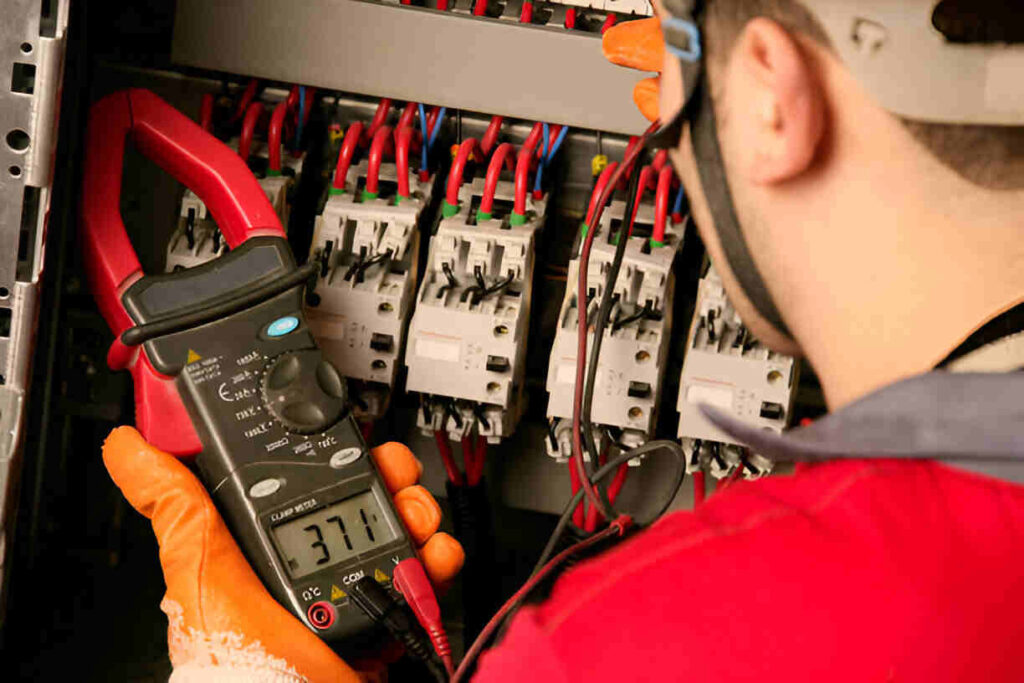
Expert Commercial Electrician Services You Can Trust Businesses need to have access to commercial electrician services to maintain their safety, comply with the legislation, and operate efficiently. They are in charge of how the electricity is distributed in establishments such as stores, warehouses, factories, and offices. The regulations are more stringent, and the procedures are more challenging when you are employed as a domestic electrician for a household. You also have to track more energy use. And if you hire a good industrial electrician, your system will work well. It will also help your business grow over time. Why Commercial Electrician Services Are Essential Businesses need power that they can depend on for their tools, lights, HVAC systems, security systems, and phone networks. People can lose time, money, and even their lives if the power goes out or something else goes wrong with the electricity. When this occurs, a company needs to invest in the services of a qualified technician who can also handle AC services to keep the entire system running smoothly and efficiently. Key Reasons to Hire a Commercial Electrician Expertise in Complex Systems: A lot of the time, three-phase systems, big tools, and tricky wiring needs can be found in business buildings. Code Compliance: Licensed electricians who are also lawyers. Learn about the rules and laws in your area to make sure that your system will easily pass inspections. Safety: Keeping electrical fires, shocks, and overloads from happening saves both people and property. Energy Efficiency: Costs can be cut by installing upgrades like LED lights and smart energy systems. Minimised Downtime: Problems can be fixed quickly, which keeps your business running smoothly. What Do Commercial Electrician Services Include? When it comes to meeting the requirements of a company, a competent team offers a broad variety of alternatives. 1. Electrical Installations New electrical wiring for retail stores, offices, and warehouses The installation of lighting systems, both inside and outside the building Installation of a generator and a backup power system 2. Maintenance and Repairs Inspections regularly to identify potential problems before they become more serious In the event of unforeseen power disruptions, the emergency repairs Upgrades to the panels and replacements of the breakers 3. Energy-Efficient Upgrades LED lights upgrades Energy surveys and keeping track of usage Building smart control tools 4. Safety and Compliance Services Protection from grounding and surges Setting up a fire alarm system Wiring for security and access control 5. Specialised Industrial Services Setting up high-voltage systems Control and wiring methods for machines Systems that provide uninterrupted power (UPS) Common Challenges in Commercial Electrical Work Electrical difficulties are a problem for even the most contemporary structures. Among the most common problems encountered by commercial electricians are: Circuits that are overloaded as a result of increased energy consumption wiring that is out of date and poses a danger of fire Inadequate maintenance can result in unexpected breakdowns Electrical regulations that are constantly developing and not being followed The absence of energy-efficient options is leading to an increase in utility expenses. A skilled electrician can find these problems early and come up with unique solutions. Benefits of Hiring Trusted Commercial Electricians The best way to ensure long-term security is to find the right expert. Peace of Mind: Licensed electricians are able to provide guarantees and liability protection. Cost Savings: Fixing things before they break down saves money on bigger fixes. Scalability: There are electricity plans that can grow with your business. Enhanced Safety: When you have a professional do your wiring, there is less chance of fire and damage to your tools. Business Continuity: Reliable power ensures that everything runs smoothly. How to Choose the Right Commercial Electrician The following things should help you choose a service company: Licensing and Certification – For business work, make sure you see the electrician’s full license. Experience with Similar Projects – Find experts who have worked with companies like yours before. References and Reviews – Look at testimonials and case studies. Availability of Emergency Services – Downtime costs a lot of money, so you need help around the clock. Transparent Pricing – To avoid any shocks, get a detailed quote. Conclusion Any business depends on its Electrician services system, and choosing an industrial electrician ensures that everything works well, is safe, and follows the rules. Whether you’re upgrading your office wiring, building energy-efficient systems, or maintaining warehouse lights, a trusted industrial electrician can help keep your business running smoothly and without costly downtime. To ensure your power systems can handle your company’s demands, it is advisable to see a specialist today. This will help make your electricity more dependable. FAQs for Commercial Electrician Services Q1: What do commercial electrician services include? Installs, repairs, maintenance, safety inspections, wiring, energy-efficient renovations, and compliance checks are among the commercial electrician services provided to businesses, offices, warehouses, and industrial facilities. Q2: How are commercial electricians different from residential electricians? Commercial electricians are in charge of larger, more difficult three-phase systems for businesses, heavy machinery, and higher power needs. Residential electricians, on the other hand, work with smaller systems for homes. Q3: How much do commercial electrician services cost? Prices change based on how big the work is, the level of difficulty, and the changes that need to be made. For a few hundred dollars, you can fix things up. But for thousands of dollars, you can add something new or make a lot of changes. Q4: Why is it important to hire licensed commercial electricians? Licensed electricians promise reliability, follow the rules, lower the risk of electrical fires, and offer warranties. References Electrical Safety Energy Efficiency in Commercial Buildings
Electrician Trainee Card: Requirements and How to Apply
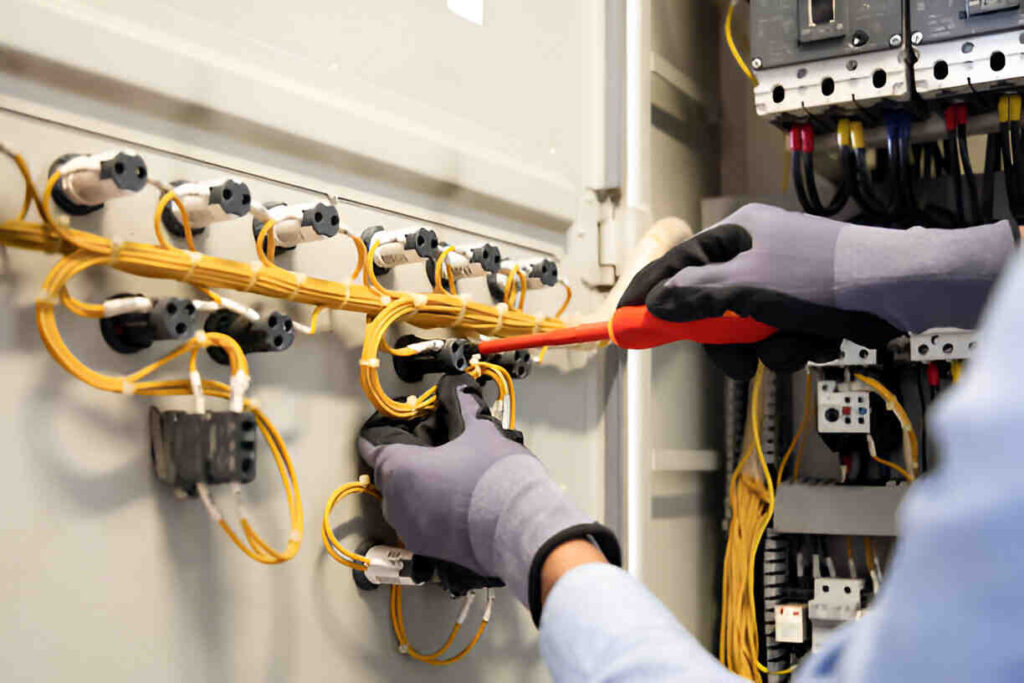
Electrician Trainee Card: Requirements and How to Apply Beginning one’s career as an electrician is both an exciting and fulfilling experience. The acquisition of an electrician trainee card, on the other hand, is one of the most critical procedures that you need to do. If you have this important document, you will earn the experience you need to become a fully registered electrician by working as an apprentice under the supervision of a qualified expert. We’ll talk about everything you need to know about the electrician training card in this guide, such as what it takes to get one, how to apply, and the perks of having one. What is an Electrician Trainee Card? A license, known as an electrician trainee card, allows individuals to work as students or trainees under the supervision of a professional electrician. The pass shows that the person is in an organized training program where they are learning the skills they need to get a license as an electrician. People who have met specific educational and training standards are given a card by the appropriate state or regulatory body. Importance of an Electrician Trainee Card Having an electrician trainee card is essential for several reasons: Legal Compliance: In many states and cities, you need an electrician training card to properly do electrical work while being supervised. Skill Development: The card lets you get real-world practice, which is essential for getting good at the job. Career Advancement: It’s often the first step required to obtain a full electrician’s license, which can help you get better jobs and make more money. Things you must do to obtain an electrician trainee card To get an electrician training card, you have to meet certain standards. These rules may be different in each state, but most states follow them. This is important for people who want to know if being an electrician is hard and what the process is. 1. Minimum Age Requirement In most states, people who want to get an electrician training card must be at least 18 years old. This makes sure that the person is of legal working age and can take part in the training program. 2. High School Diploma or GED Most of the time, you need a high school graduation or something similar, like a GED. In this way, you can be sure that you have the basic schooling you need for the theoretical parts of the job. 3. Enrollment in a Training Program To become an electrician trainee, you must first join a recognized electrical apprenticeship or training program. Trade schools, unions, or contractors often give these programs. The duration of these programs varies, but they commonly span between two and five years. You might be thinking how to get an electrician apprenticeship if you don’t know where to begin. Typically, the first step is to research and apply to training programs. These can be run by unions, trade groups, or companies that offer on-the-job training. Most internship programs let you learn in the classroom and gain experience on the job. This is a great way to start your work. 4. Supervision by a Licensed Electrician People who teach you how to be an electrician will need to keep an eye on you and tell you what to do. By doing so, you will guarantee that you will continue to develop the abilities that are required for the career. 5. Proof of Work Experience Some states may ask you to show proof of work experience or hours when you apply for a training card. This will make sure that you keep learning the skills you need for the job. How to Apply for an Electrician Trainee Card The application process for an electrician trainee card generally involves several key steps: 1. Complete a Training Program You must have finished or been in an approved state-recognized electrical job or training program before you can apply for the card. Two parts of this will be work practice and lessons in the classroom. Electrical rules, safety standards, wiring, and circuit design are just some of the things that the training course will cover. 2. Gather Required Documentation Once you have finished the requisite curriculum or are presently enrolled, you must obtain the following documents: Evidence of age (birth certificate or identification issued by the government) Diploma from high school or General Equivalency Diploma Confirming the enrolment of participants in your training program Proof of work hours (if required) 3. Submit Your Application To minimize delays, ensure that you correctly fill out all portions of the application and submit it to the relevant regulatory agency. Some states offer online application portals, while others may ask for hard copies of your papers. 4. Pay the Application Fee There is a fee in most states to fill out the application for an electrician training card. The amount of money it costs changes, so check the rules in your state. 5. Wait for Approval After submitting your application, you will have to wait for approval. Once authorized, you will be issued an electrician trainee card, allowing you to legally begin working as an apprentice under the supervision of a professional electrician. Duration and Renewal of Electrician Trainee Cards The electrician trainee card is usually valid for one or two years. Following that, you must renew your card by providing confirmation of continuous enrolment in your training program and paying the renewal price. Benefits of Having an Electrician Trainee Card Obtaining an electrician trainee card offers several benefits: Legally Authorized Work: The card gives you the legal right to work as an electrical student or trainee. Industry Recognition: Companies that are interested in hiring you will see that you are serious about the job and want to learn the skills they need. Job Opportunities: Many companies prefer to hire individuals who are working towards licensing, as it demonstrates their dedication to their career and strong work ethic. Path to Licensure: The trainee card is frequently the first step on
How to Get an Electrician Apprenticeship
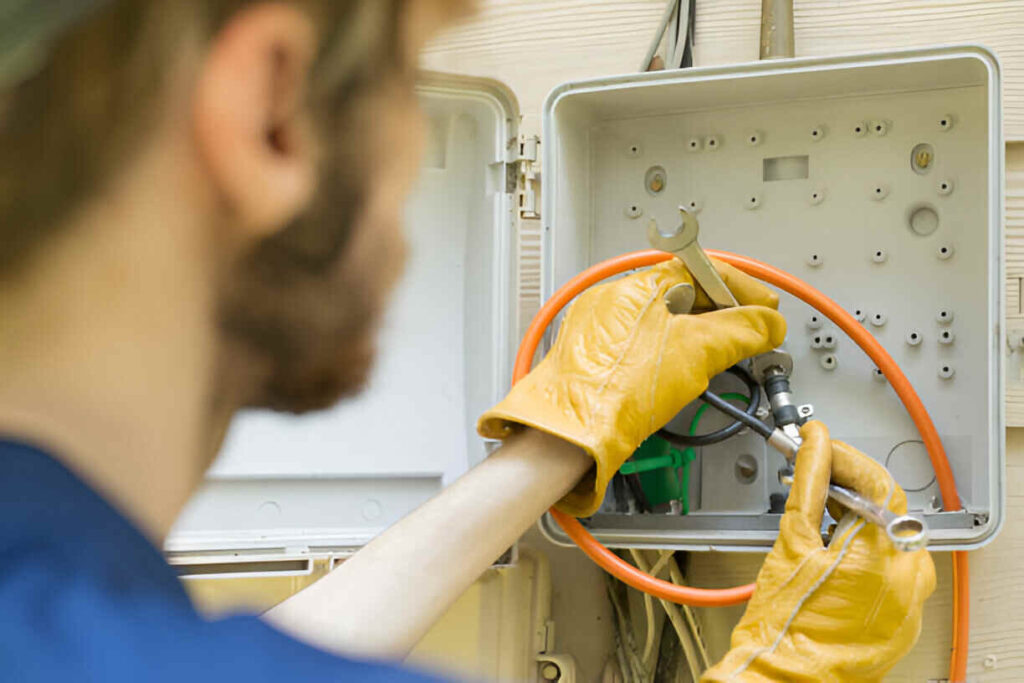
How to Get an Electrician Apprenticeship Starting a career in a skilled job can be good for your career and your finances. If you’re wondering how to get an electrician apprenticeship. Getting a high school diploma or GED is usually the first step. After that, you should apply to a recognized internship school that mixes training in the classroom with training on the job. If you’re new to the job market or switching careers, this guide will help you figure out how to start, even if you have never done it before. Why Choose an Electrician Apprenticeship? To become an electrician, you need to learn more than just how to wire things. You also need to build a job in a trade that is in high demand and pays well. The U.S. Bureau of Labour Statistics says that the number of electrician jobs will grow by 6% between 2022 and 2032. The average salary for an electrician is over $60,000 per year. Some people ask, Is being an electrician hard? The answer depends on your interest and willingness to learn. The apprenticeship method offers the training and assistance required to succeed despite the job’s technical and physical challenges. Benefits of an Electrician Apprenticeship Earn while you learn No student debt Hands-on experience Industry certification Strong job security Understanding How to Get an Electrician Apprenticeship What Is an Electrician Apprenticeship? An electrician internship is an organized training program that includes both classroom and on-the-job training (OJT). To Become Electrician a qualified journeyman you have to go through these schools which usually last between 4 and 5 years. How to Get an Electrician Apprenticeship With No Experience You might be shocked to learn that you only need to know the proper steps and have the right attitude to get started. Get Your High School Diploma or GED For most training programs, you need at least a high school education. Pay attention to things like Math (especially algebra) Physics Technical drawing or shop class (if available) Apply to a Pre-Apprenticeship Program (Optional but Valuable) Before you start your training you learn how to use basic tools stay safe and understand how electricity works. Taking these lessons can help you get your Electrician Trainee Card even if you don’t have much experience. Check with the community college or job development program in your area. Young people can get free education through programs like Job Corps. Find a Registered Apprenticeship Program Here’s where your real journey begins. Consider the following types: Union Programs (IBEW/NECA) It is provided by the Joint Apprenticeship and Training Committees (JATC). Competitive but highly respected Non-Union Programs (IEC or ABC) Offer open hours and a range of relationships with employers. Direct Employer Apprenticeships Some electricians have schools where people can learn how to work for them. Search for registered programs at: apprenticeship.gov IBEW Local Union Directories Requirements to Apply In most cases, you need to do the following to be considered for an apprenticeship: Be 18 years or older Possess a valid driver’s license Pass a basic aptitude test Undergo a physical exam Pass a drug screening Demonstrate basic math skills Tips to Strengthen Your Application There are several ways to stand out, even if you haven’t done this before: 1. Volunteer or Intern Look for chances to work with or watch a registered electrician. Being exposed for even one to two weeks shows effort. 2. Build Basic Skills Familiarize yourself with: Hand tools like pliers and wire strippers Safety standards (e.g., OSHA basics) Simple circuitry and diagrams 3. Craft a Professional Resume Include courses, charity work, and certificates that are applicable, such as: OSHA 10 or 30 CPR and First Aid Basic electrical theory (if self-taught or taken online) Career Outlook After Apprenticeship You’ll be able to take the journeyman test after you finish your training. You have more choices when you have a license: Residential electrician Commercial electrician Industrial electrician Electrical contractor or business owner With more advanced certificates and badges, you can become an expert in: Solar power systems Building automation High-voltage systems Conclusion Knowing how to get an electrician apprenticeship, even with no experience, can be the gateway to a high-paying, stable career. First things first, make sure you have a solid foundation like your diploma or GED. Then look for good programs and remember. It’s okay to start with the basics. Suppose you stay dedicated and follow the proper steps. You’ll be wiring your future in both a literal and figurative sense. Frequently Asked Questions Can You Get an Electrician Apprenticeship Without Any Experience? Yes, several programs are geared at total novices. Pre-apprenticeship programs or vocational school courses may improve your prospects, but they are not always necessary. How Hard Is It to Get an Apprenticeship? Some of them, like union programs, can be competitive. You will stand out if you are good at math, have a clean record, and are aggressive. How Long Is an Electrician Apprenticeship? Typically four to five years, with around 8,000 hours of OJT and 500-1,000 hours of classroom instruction.
Is Being an Electrician Hard? Learn the Real Facts

Is Being an Electrician Hard? Learn the Real Facts Introduction If you want to become a driver, is being an electrician hard? Electricians do more than fix wires and put in plugs. They make sure that homes are safe, that power systems work right, and that business equipment works well. But that kind of duty comes with mental, physical and technological responsibilities. This piece goes into detail about the real problems and perks of the job to help you decide if it’s the right choice for you. What Does an Electrician Do? Electricians build, manage, and fix electrical systems in homes, businesses, and factories. Their day-to-day tasks may include: Plugs, lines, and circuit switches are being put in. Making plans for how to set up the power in new buildings Getting power issues fixed Putting in lights and safety gear Reading and drawing building plans and guidelines This wide range of skills is why many people wonder: is being an electrician hard? The Physical and Safety Demands of the Job Physical Strain You’ll have to stand for a long time, climb stairs, and move big things around as part of the job. It may be necessary to lift wire reels or navigate through roof crawl spaces, both of which can be challenging tasks. Safety Risks Electricians work with live wires and equipment that move a lot of power. The possibility of arc flashes, being shocked and falling is a very real possibility. According to the United States Department of Labour, welders have a higher risk of dying on the job as a result of electrocution than other workers. Bureau of Labour Statistics. A lot of knowledge about safety rules, PPE and safe tools is needed to stay safe and not get hurt badly. The Learning Curve: Apprenticeship & Technical Knowledge Apprenticeship Requirements A paid internship that includes both classroom and on-the-job training is how most electricians get their start. This Electrician Apprenticeship usually lasts four to five years (8,000 to 10,000 hours) of work and study under close supervision. Technical Complexity It takes a lot of hard work to learn electrical theory, the National Electrical Code (NEC), and local building codes. A lot of apprentices think the teaching part is just as hard as any college course. Still, a lot of people think that internships are a better way to learn than a standard four-year degree. Mental and Problem-Solving Demands Electricians have to fix a lot of problems that are hard to fix. When you work with old systems, lost lines, or busy circuits, you need to be able to think critically. There is no room for error in electrical work (trdsf.com). Key Mental Demands: Being able to read wiring and building plans Getting energy formulas and load numbers The right things to do when you’re stressed Pros and Cons: The Big Picture Pros: Job Stability & Demand — Builders and people who do routine repairs always need electricians. Good Pay — Journeymen electricians and electricians who work for themselves usually make good pay. Variety — Every day, work changes between different projects and places. Path to Advancement — You can become an electrician, start your own business, or even work your way up to being a master electrician boss. Cons: Physically Demanding — Long hours, odd angles and a lot of heavy lifting. Risk of Injury — Gets an electric shock, falls and gets burned. Long Training Period — With an apprenticeship, you might not get paid fully for years. Constant Learning — As codes change, electricians need to keep up with them. Is Being an Electrician Hard? It Depends on You Your experience will vary depending on: Physical Fitness — Are you ready for harsh conditions? Learning Style — Can you learn scientific things and codes quickly? Tolerance for Risk — Do you follow safety rules all the time? Problem-Solving Skills — Do you like solving problems when time is tight? Many electricians say that their job is difficult but not impossible, fulfilling, and a good option for going to college. How to Prepare for a Career as an Electrician Apply for apprenticeships: Look for programs offered by ABC, IBEW/NECA, or union-sponsored initiatives. Brush up on basics: Concentrate on reading technical schematics, physics and mathematics. Gain physical stamina: Light lifting is a good way to begin conditioning. Commit to safety culture: Early on, learn PPE and safe work procedures. Start with hands-on: Practice wiring outlets and switches using kits. Conclusion So, is being an electrician hard? Yes, but difficult does not equate to impossible. The profession requires technical proficiency, mental acuity, safety awareness and physical stamina. However, it also provides employment satisfaction, stability and financial benefits. The rewards are worthy, and the hurdles are doable with the correct mindset and training. FAQs Q1. Is becoming an electrician physically demanding? Yes, it often entails lifting, crawling, climbing, and long hours of labor, all of which call for strength and endurance. Q2. What is the duration required to become an electrician? Usually lasting four to five years, with between 8,000 and 10,000 hours of classroom instruction and apprenticeship. Q3. Do electricians put their lives in danger while working? Electric shock, burns, and falls are real risks, but they are kept to a minimum by strict safety rules and training. Q4: Does being an electrician take more work than college? Although it still requires commitment, many apprentices claim that since it is more hands-on, it is less psychologically demanding than a four-year degree.
Domestic Electrician Services Explained Simply
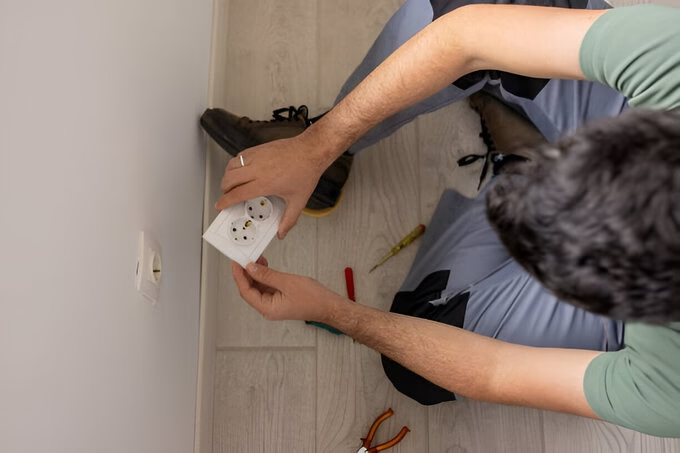
Domestic Electrician Services Explained Simply You’ve likely needed a house plumber at some point if you own your own home. But what does a home plumber really do? And why is it important to get a good one? This complete guide breaks down the work of a domestic electrician into easy-to-understand steps. It tells you when to call one and how to pick the best one for your needs. What is a Domestic Electrician? As the name suggests, a household electrician’s main job is to set up, manage, and fix electrical systems in homes. Their job is to make sure that houses are safe, up to code, and use energy efficiently. Key Responsibilities: Putting in and changing out home wiring Putting in ceiling fans and light fixtures Putting in or changing the electricity plugs and switches Putting in new circuit switches and fuse boxes Doing checks for electricity safety Why Hire a Domestic Electrician? It can be dangerous to work with electricity. A qualified home electrician knows how to do the job properly and safely and has the right tools for the job. Benefits of Hiring a Professional: Safety: Keeps you safe from things like electricity, fires, and shocks Compliance: Makes sure the work follows the rules in the area Expertise: Checks for problems correctly Insurance: A lot of the time, home insurance covers professional work. Carpenter vs Electrician: Who to Call for Home Projects? When deciding between a carpenter vs electrician. It’s important to know who handles what. Domestic electricians do all kinds of electrical work. While builders work with wood and build things. If your job includes both building and wiring like putting in hidden lights in a wooden ceiling or installing a spa setup you might even need a Hot Tub Electrician. For safety and effectiveness always talk to the right professional. Common Services Offered by Domestic Electricians 1. Electrical Installations Electricians set up all the wires and power in a home, whether it’s a new build or a renovation. This includes things like plugs, lights, and machines. 2. Fault Finding and Repairs Your lights might be flashing, or your outlets might not be working. A household electrician can figure out what’s wrong and fix it. 3. Fuse Box and Consumer Unit Upgrades Fuse boxes in older homes may not work as well as they used to. For better safety, electricians replace these with new customer units that have RCDs (residual current devices). 4. Lighting Installation Electricians make sure that all kinds of lighting, from chandeliers to LED downlights, are set up safely and correctly, both inside and outside. 5. Electrical Inspections Routine checks find problems that aren’t obvious and keep people safe. They are often needed when selling or buying a home. Signs You Need a Domestic Electrician Lights that flicker or dim A lot of circuit breakers trip A burning smell coming from the plugs or switches Wiring that is too old (mostly in homes over 30 years old) We need more power sources or power ability. How to Choose a Reliable Domestic Electrician 1. Check Licensing and Certifications Make sure that the electrician has a license and insurance. On the island of Great Britain, look for NICEIC or NAPIT marks. 2. Read Reviews and Testimonials Customer reviews on sites like Trustpilot and Google Reviews can show how good a service is and how reliable it is. 3. Ask for Quotes Get more than one quote so you can compare prices and job scopes. Be wary of prices that seem too low. 4. Confirm Warranty and Guarantees Trustworthy electricians will cover both the parts and the work they do. 5. Assess Communication and Professionalism A good electrician will be able to explain problems and come up with good answers easily. Conclusion It doesn’t have to be hard to understand what a home electrician does. These trained workers make sure that the electrical systems in your home are safe, working well, and up to code. To get the job done right, you should always hire a licensed and trustworthy household electrician, whether you’re changing a fuse box or putting in new lights. A Commercial Electrician is the right person to call if you’re working on real estate for a business. FAQs About Domestic Electricians Do I need an electrician to replace a light fixture? Yes. Some people try to do their installs, but it’s safer and often required by law to have a professional electrician do it. How much does it cost to hire a domestic electrician? Costs depend on where the job is and how hard it is. Hourly rates will be between £40 and £90, and parts will cost extra. Are electrical inspections mandatory? Most of the time, yes, especially when homes are being sold or rented. They make sure that the building meets current safety standards. Can an electrician help with smart home devices? Of course. A lot of home engineers set up and install smart home systems like security, lights, and heaters. External Resources TLPorterElectrical-A Domestic Electrician MahirCompany-Electrician Services
Carpenter vs Electrician: Which Trade Is Right for You?

Carpenter vs Electrician: Which Trade Is Right for You? Picking a skilled job can change your whole life. Carpentry and electricity work are two of the most recognised and sought-after skills. You have to choose between becoming an electrician vs carpenter. That being said, this guide will break down the pros and cons of each road and help you choose the one that fits your goals the best. Understanding the Basics What Does a Carpenter Do? Carpenters use wood and other materials to build, place, and fix things like buildings and furniture. They might be experts in things like finishing, framing, or building cabinets. Typical tasks include: Learning how to read plans and scientific drawings Cutting, measuring, and putting together things Putting up walls, floors, doors, and windows fixing up and redesigning old buildings What Does an Electrician Do? Electricians set up, maintain, and fix electrical systems in homes, companies, and factories. They work with electrical parts like plugs, circuit switches, wires, and more. A foreman electrician is usually in charge of a group of electricians working on big projects. They make sure that the work is done safely, well, and on time. Typical tasks include: Drawing and reading wiring diagrams Putting in and fixing lighting, control, and wiring systems. Checking the safety and efficiency of electricity systems Making sure that building rules are followed Educational Requirements Carpenter Training Path High school diploma or GED Apprenticeship (3-4 years) Optional training or tech school Electrician Training Path High school diploma or GED Formal apprenticeship (4-5 years) State licensing exam Continuing education for code updates Note: Most states require electricians to have licenses, but some don’t require permits for builders unless they work as contractors. Skill Sets Needed Skills for Carpenters: Strength and skill of the hands Attention to detail Basic math and geometry Knowledge of materials and tools Skills for Electricians: Strong problem-solving skills Understanding of electrical theory Ability to keep going and focus on what you’re doing Being able to work at heights or in small areas Work Environment and Conditions Carpenters: Usually work outside or on busy building sites. Exposed to weather conditions and noise Risk of cuts, falls, or injuries from tools. Electricians: Work indoors and outdoors May find their way through attics or hidden rooms Electrical shock risk if safety rules aren’t followed Career Outlook and Salary Job Growth According to the U.S. Bureau of Labour Statistics: Carpenters: Projected job growth of 2% from 2022 to 2032 Electricians: Projected job growth of 6% over the same period Salary Comparison (2025 Averages) Carpenters: ~$54,000 per year Electricians: ~$65,000 per year Because license standards are getting tighter and the need for electrical equipment is rising, electricians tend to make more money and have more job stability. Pros and Cons of Each Trade Carpenter Pros: Creative and satisfying work Lower entry barrier Versatile skill set Carpenter Cons: Lower average salary Physically demanding Susceptible to seasonal slowdowns Electrician Pros: Higher income potential Strong job security Steady demand for skilled electricians Electrician Cons: Extensive training and licensing required Higher safety risks May involve stressful troubleshooting Which Trade is Right for You? Ask yourself the following questions: Would you rather work with your hands (as a builder) or figure out complicated processes (as an electrician)? Do you like visual or artistic work more, or do you like fixing scientific problems? Do you want to get a job faster (as a builder) or get paid more over the long run (as an electrician)? Final Thoughts Both trades offer rewarding jobs with good job prospects. If you like making things, you might be interested in becoming a carpenter. You should become an electrician if you enjoy working with technology and processes. Putting money into a trade can lead to a safe and profitable future, either way. External Resources and References For more information, consider visiting: U.S. Bureau of Labor Statistics – Electricians National Electrical Contractors Association (NECA)
Foreman Electrician Salary, Skills and Career Growth in 2025

Foreman Electrician Salary, Skills and Career Growth in 2025 Introduction As building technology improves and the need for skilled workers grows the job of a foreman electrician will continue to change. This job has become more valuable, competitive and necessary on job sites across the U.S. as we move into 2025. If you’re an engineer who wants to be a supervisor or who already is one. It’s important to know how much they make, what skills they need and what job options are available. In this guide, we’ll explore: How much will electricians be in charge of making in 2025? The most important and advanced skills Ways to move up in your career and growth in your business Advice on how to stay competitive and make more money What Is a Foreman Electrician? A manager electrician is a senior electrician who is in charge of a group of workers on a job site. They are in charge of: Overseeing the setup and upkeep of electricity systems Making sure that the area safety and building rules are followed Getting customers, workers and project managers to work together Getting supplies and keeping track of plans With its mix of hands-on experience and project management this is one of the most exciting skilled trades jobs. Certifications and Education You don’t need a college degree to become a master electrician, but understanding how long it takes to become an electrician and gaining certain qualifications can help improve your reputation and salary. A journeyman electrician’s licence is needed in most states. Master Electrician License OSHA 30 Certification Those who want to work in top management can become Project Management Professionals (PMPS). NFPA 70e Electrical Safety Certification Foreman Electrician Salary in 2025 National Average As of 2025, the average pay for a master electrician in the U.S. is between $70,000 and $95,000 per year. In high-demand places skilled workers make over $100,000 per year. Salary by Experience Level Experience Average Annual Salary 5–7 Years $70,000 – $80,000 8–10 Years $85,000 – $95,000 10+ Years $95,000 – $110,000 Top-Paying States for Foreman Electricians California: $100,000+ New York: $95,000+ Washington: $92,000+ Texas: $88,000+ Illinois: $85,000+ Core Skills Required for a Foreman Electrician You’ll need more than just wiring skills to do well in this leading job. These are the most important skills: Technical Skills A deep understanding of the National Electrical Code (NEC) Being good at using plans, diagrams and CAD sketches Having experience with wiring in homes, businesses and factories Leadership and Communication Supervising a team and resolving conflicts Open lines of contact with project partners and workers Being able to teach trainees and young electricians Project Management Management of time and resources Tracking the budget and buying materials Enforcing safety rules and following OSHA rules Problem-Solving Abilities Figuring out complicated electrical problems Giving job places real-time answers Getting used to sudden changes or delays in a project Career Growth and Future Outlook Industry Growth The BLS says that the need for electricians will grow by 6% between now and 2032, which is faster than the average for all jobs. The rise of Green energy Smart building systems Commercial construction booms …means more job opportunities for skilled supervisors. Career Pathways Electrical Project Manager Construction Superintendent Electrical Estimator Business Owner (Electrical Contractor) How to Advance Your Career Attend leadership training and trade shows. Network within local trade unions or industry groups Learn how to use new tools like solar panels and building control systems. FAQs How do I become a foreman electrician? You typically need: A high school diploma or GED 4-5 years as a journeyman electrician Strong leadership and problem-solving skills Certifications like OSHA 30 and NEC familiarity Is it hard to be an electrician’s foreman? It might be because you have to deal with people, scheduling, and technology issues. But a lot of people enjoy the job because they get paid well and have to be leaders. I don’t have a trainee’s licence. Can I become a foreman? No, in most states. To officially lead a group, you need to be an apprentice or master electrician. Conclusion In 2025, a master electrician’s job is more important than ever. This is a great career path for plumbers who are ready to take charge because the pay is good, there are chances to move up, and the job market is always growing. If you already work as an electrician, getting certified and learning how to be a leader could be your next big move. Foreman electricians will continue to actually power the future, whether they’re in charge of high-rise installations or home repair teams. Interested in growing your career as a foreman electrician? Stay updated on salary trends, certifications, and career advice by bookmarking trusted resources like the Bureau of Labor Statistics, NECA, and Electrical Contractor Magazine.
How Long Does It Take to Become an Electrician?
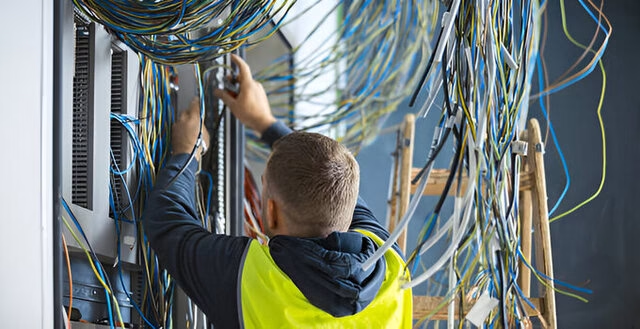
How Long Does It Take to Become an Electrician? In the US, being an electrician is a good job with steady hours, good pay, and room to move up. How long does it take to become an electrician? Many things come into play, such as the rules in the state, the type of repair job, and how quickly the person is learning and completing their training. There are a lot of steps you need to take and training goals you need to reach to become a trained electrician in the US. Why Choose a Career as an Electrician? All over the country, people need electricians. The BLS says there will be 6% more jobs for plumbers in 2022. The rate here is about the same as the average for all jobs. More buildings are being built to meet the demand for green energy sources as more people use them. Education Requirements to Become an Electrician Step 1: High School Diploma or GED You’ll need a high school diploma or GED to begin your journey. Math, science, and shop classes can help build a strong base. Step 2: Enroll in a Trade School or Community College (Optional) Some people who want to become electricians attend a community college or trade school. Usually, these classes last 6 months and 2 years and teach basic electrical theory, wiring, and safety rules. Benefits of Electrical School: Structured learning environment Hands-on experience with tools and equipment Potential for faster entry into apprenticeships Timeline Summary: How Long Does It Take to Become an Electrician? Step Duration High School Diploma or GED 4 years (or equivalent) Trade School (Optional) 6 months to 2 years Apprenticeship 4 to 5 years Journeyman Licensing Upon completion of apprenticeship Master Electrician Certification 1-2 years after journeyman Total Estimated Time: 4 to 8 years (depending on your path) You may want to know how long it takes to become a plumber if you are also interested in other skilled jobs. Even though they are structured similarly, plumbing jobs may have different start dates and license needs in various areas. Both trades offer safe, hands-on jobs with lots of money-making possibilities. Electrical Apprenticeship: The Core of Electrician Training What is an Apprenticeship? An internship is a way to learn both on the job and in the classroom. Most people who want to become electricians do it this way. How Long Does an Electrical Apprenticeship Last? Apprenticeships typically last 4 to 5 years and include: 8,000 to 10,000 hours of on-the-job training 500 to 1,000 hours of classroom instruction An apprentice electrician works for a licensed electrician and learns how to connect circuits, read plans, and follow the National Electrical Code (NEC). Where to Find an Apprenticeship Programs run by unions, like those run by the International Brotherhood of Electrical Workers (IBEW). Programs that aren’t run by unions, like those run by the Independent Electrical Contractors (IEC) Local contractors or trade associations Obtaining a License: Journeyman Electrician You have to pass a state test and finish your training before you can become a journeyman electrician. Journeyman License Requirements Requirements vary by state but generally include: Proof of completed apprenticeship Passing score on an electrical exam Application and licensing fees Once they have their license, journeymen can work independently, but state rules may limit what they can do. Advancing to Master Electrician Becoming a master electrician typically requires: 1 to 2 more years of experience as a junior worker Passing a master electrician exam Master electricians can run their businesses, get licenses, and oversee work. Continuing Education and Specialisations Electricians can specialise in areas such as: Residential wiring Commercial systems Industrial equipment Solar and renewable energy Low-voltage systems (e.g., alarms, fibre optics) Many states require ongoing education to keep a license up to date and in line with the latest laws and tools. Career Outlook and Salary According to Bls.gov: Median Pay (2023): $60,240 per year ($28.96 per hour) Top 10%: Over $99,800 per year Industries Hiring: Companies in construction, industry, government, and utilities. Tips for Success Start Early: In secondary school, you should join a program that prepares you for work as an apprentice. Network: Get involved with local unions or contractors. Stay Safe: Follow all OSHA and NEC guidelines. Stay Updated: New tools and code changes happen all the time. Conclusion How long does it take to learn how to be an electrician? Usually between 4 and 8 years, but it depends on what you want to study and what job you want to pursue. This skilled job is a good way to make money and have a safe future, whether you go to trade school first or immediately start an internship.